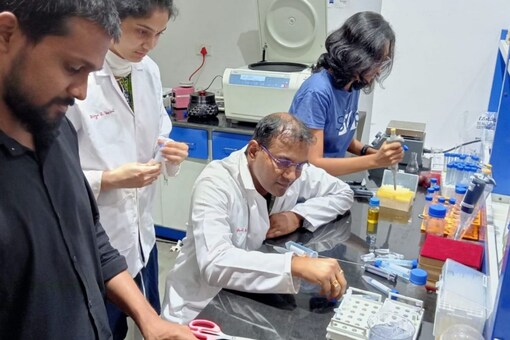Dr Mudassir Rafi
- Published in Assistant Professor, Faculty, SEAS
Dr Akuthota Sankar Rao
- Published in Assistant Professor, Economics Faculty, Faculty, SLASS
Dr V L Narasimham
- Published in Assistant Professor, Economics Faculty, Faculty, SLASS
Dr Anil K Suresh’s path-breaking invention helps SRM University-AP “scale” new heights in scientific research!

Dr Anil K Suresh, Associate Professor, Department of Biological Sciences with his team at SRM University-AP has developed a see-through transparent bio-template made from fish scale wastes. The sustainable transparent (over 85% transmittance) bio-template can substitute the use of eco-unfriendly disposal plastic cuvettes for UV-Visible Spectroscopy measurements in the spectrum of 350-900 nm. The path-breaking work to be published in the prestigious Journal of “Green Chemistry” by the Royal Society of Chemistry, is another in the line of extensive, socially, and scientifically relevant research studies that have taken form at SRM University-AP.
The multidisciplinary, research-intensive university since its inception, has emphasized research that has an impact on society. Through projects, collaborations and offering solid support to scholars, it has lived up to its mission of redefining the boundaries of advanced research. The new research by Dr. Suresh and his team comprising Ms Divya Parimi, Mr Chandra Bhatt, Mr Tharun Bollu, Ms Madhura, and collaborators Dr Malli and Mr Jacob is another noteworthy effort in the same vein. Besides minimizing the use of non-biodegradable plastic cuvettes for routine analytics, their bio-template offers many significant benefits.
UV-Vis spectroscopy is a versatile analytical tool used to examine the nature of various synthetic, biological and clinical molecules for pharmaceutical and environmental applications. The analysis is typically performed in a “cuvette or microplate” that is made of expensive quartz or eco-unfriendly plastic materials. The bio-template made from fish scale wastes can not only be an eco-friendly substitute but an effective one too. The team members have clearly demonstrated the practical on-bio template analysis of diverse analytes such as DNA, proteins, nanoparticles, organic dyes, bacteria, BSA assay, and dye-degradations.
Interestingly, the research team also demonstrated the ease in large-scale production of these bio-templates by generating 3000 of them at an affordable price. Dr Suresh, who owns the copyright for the invention after being granted an Indian patent says, “Large-scale development of the bio template can resolve several issues in performing sustainable research.” For starters, it will generate a demand for fish scales, which are usually discarded and can be a cause for foul smell and disease propagation. The use of these bio-templates will also minimize the need for non-biodegradable plastic cuvettes in routine analytics.
Dr Suresh highlights another benefit of the team’s path-breaking research when he says, “Unlike plastic cuvettes that demand a 500-fold analyte, our bio template allows the analysis at shallow 10 microlitre volumes, making it feasible to analyze expensive, rare, and high-risk analytes.” After use, the transparent bio template can be discarded back into the environment without any hesitation, as it is entirely biodegradable. The research that stemmed from the belief that food waste as a bio-resource stratagem has tremendous potential in routine scientific and pharma UV-Vis analytics is living up to that goal.
Dr Suresh is now set to bring the transparent bio-template made from fish scale wastes to the scientific community as a sustainable solution. He is grateful to his team’s efforts and the support he has received from the management at SRM University-AP throughout the research project. “I would like to thank Dr P Sathyanarayanan, President; Prof D Narayana Rao, Pro-Vice-Chancellor, Prof V S Rao, Former Vice-Chancellor and the entire management team for their untiring encouragement, motivation, and support in all my endeavours,” he says as the university “scales” new heights in the world of research, one significant invention at a time.
- Published in Biological Sciences Faculty, Blog, Faculty Achievements, Research
Dr Md Faiz Ahmad
- Published in Assistant Professor, Faculty, Management Faculty, SEAMS
Dr Harish Puppala
- Published in Assistant Professor, CE Faculty, Faculty, SEAS
PhD in Electrical & Electronics Engineering: Forge the Future of Technology and Solve Complex Challenges
- Published in Admissions, Blog, EEE, SEAS
Explore Politics Beyond the Textbook: Enrol in a BA Political Science Course
- Published in Admissions, Blog, SLASS

